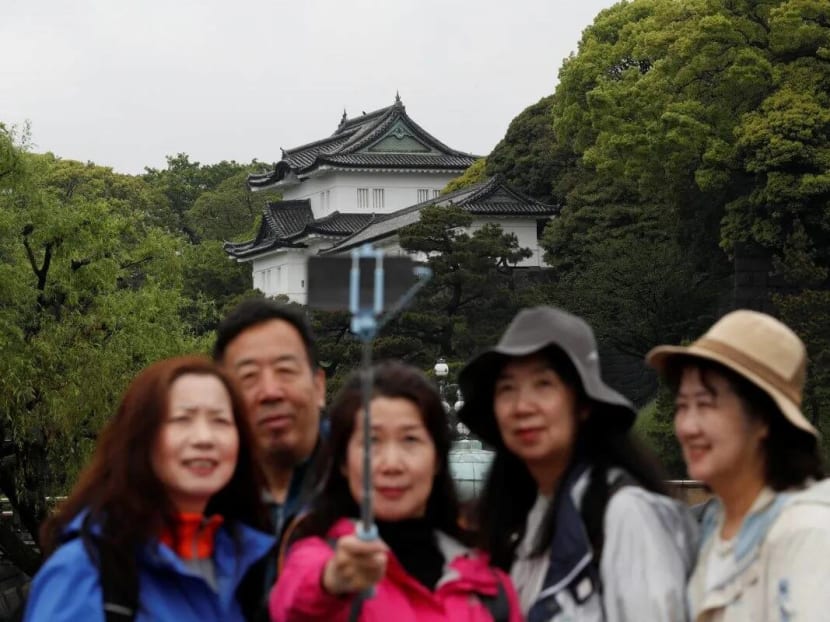Chinese tourism to Japan hits record highs, as travellers turn their back on protest-hit Hong Kong, Taiwan
HONG KONG — Li Yue and his wife were once frequent visitors to Hong Kong, travelling from the southern Chinese city of Shenzhen most Christmas holidays to see the city’s light show and splurge on international brands hard to come by in the mainland.
HONG KONG — Li Yue and his wife were once frequent visitors to Hong Kong, travelling from the southern Chinese city of Shenzhen most Christmas holidays to see the city’s light show and splurge on international brands hard to come by in the mainland.
But this year, the couple are thinking about skipping the protest-racked city for a new destination: Japan.
“In the past it was difficult to get a visa for developed countries, so travelling to Hong Kong was the most convenient and practical way for us to shop for global goods, enjoy an international metropolitan atmosphere and socialise with people from around the world,” said Mr Li, an IT engineer in his 40s.
“But it is now awkward and difficult for us (mainlanders) to visit either Hong Kong or Taiwan … Of course, Japan stands out as the next best choice.”
Mr Li and his wife are among a growing number of middle class and upper middle class Chinese visiting Japan, driving a boom in tourist numbers and helping smooth over the sometimes strained relationship between the two countries as a result.
China and Japan, the world’s second- and third-largest economies, have long had an uneasy bilateral ties. Many Chinese believe Japan has not adequately acknowledged the extent of its brutal second world war occupation of the country, while China’s growing assertiveness, including claims to disputed islands in the East China Sea, has ratcheted up territorial tensions.
The rocky relationship, often fanned by fiery nationalist movements in each country, is further complicated by the close trading ties between Asia's two largest economies.
But with Chinese tourism to Japan hitting new highs as anti-government protests scare mainland visitors away from Hong Kong, and restrictions limit tour groups and independent travel in Taiwan, there are signs that attitudes may be changing.
“After going to Japan several times, I have had more contact with the Japanese and now have a deeper understanding of Japanese culture,” said Ms Lin Xia, a media manager in Shanghai. “In the 2000s, a lot of Chinese were in an anti-Japanese mood for a few years, but now most of my friends feel Japan is a very harmonious, friendly and mature modern country.”
Beijing resident Frank Cui, who lived in Japan for years but now runs a tech consulting firm linking Chinese companies and talent with the rest of Asia, said China's relationship with Japan was entering a new phase.
“The relationship between China and Japan – both the government and civil society – is now in its best honeymoon period in a decade,” he said.
Japan is one of China’s most popular tourist destinations and some 8.38 million Chinese visiting last year, up 13.9 per cent year on year. Chinese visitors spent more than 1.5 trillion yen (S$18 billion) in 2018, accounting for nearly 34 per cent of all spending by foreign visitors, according to Japanese government data.
“We used to go to Hong Kong for shopping once or twice every two months, but since this summer, almost all of us have turned to Japan or Macau to shop for consumer goods,” said Mr Stephen Yao, a Guangzhou businessman who has made three trips to Japan this year where he spent about 50,000 yuan (S$9,691) daily.
“Although the renminbi has depreciated significantly against the yen, it clearly has not affected the enthusiasm of Chinese tourists to spend in Japan,” he said.
While many visit Japan to see its bustling cities or historic temples, a substantial number are also booking medical check ups, or looking for property and new business opportunities.
“My company served a total of about 500 high-end Chinese tourists last year. They went to Japan to play golf, as well as access health care services and look for properties to invest in,” said Mr Eiha Jo, founder of Tokyo-based tour company China Enterprise. “In the first 11 months of this year, we have already received more than 600 Chinese tourists.
“It’s quite common to see local physical examination centres full of Chinese tourists.”
Middle class Chinese families were also looking to buy flats ranging from 80 million to 150 million yen, Mr Jo said, while listed companies and private entrepreneurs were looking to invest in hospitals, hot springs and golf courses.
Chinese visitors to Japan surged 11.7 per cent to 4.5 million in the first half of 2019 from a year earlier, according to Japan’s government, but travel industry insiders think the figure could exceed 10 million by year’s end – an upwards trend that is changing Chinese impressions of Japan.
“Many of my friends travelled to Japan in the past two years, and most of them like to travel to Japan multiple times per year because we have all started to love Japanese society,” said Xia Ms Xiaonuan, a 34-year-old photographer from Hangzhou in east China.
“Four of my friends have invested in Japanese property in recent years, from one-bedroom flats in Tokyo to detached houses in the rural area.” SOUTH CHINA MORNING POST







